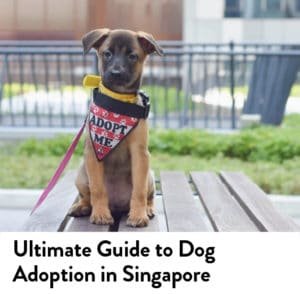Table of Contents
Having a furry companion can bring immense joy and happiness to your life, and if you’re residing in Singapore, it’s important to understand the ins and outs of having a dog in this vibrant city-state. From navigating through dog-friendly parks and pet-friendly accommodations to knowing the specific regulations and requirements, this ultimate guide aims to provide you with all the essential information you need to ensure a wonderful and fulfilling experience as a dog owner in Singapore. So, whether you’re a local resident or an expatriate, get ready to embark on this exciting journey of dog ownership in the Lion City.
Choosing the Right Dog Breed
Considering Apartment Living
When choosing a dog breed, it is important to take into consideration the living arrangements in Singapore, especially if you reside in an apartment. Dogs vary in size and energy levels, so it is crucial to select a breed that can adapt well to living in a smaller space. Smaller or medium-sized breeds, such as the Shih Tzu or French Bulldog, are often better suited for apartment living as they require less space to roam and may be more content with indoor activities.
Understanding the Climate
Singapore has a tropical climate, which means it is hot and humid throughout the year. Some dog breeds are more sensitive to extreme temperatures and may struggle in such a climate. It is essential to choose a breed that can tolerate the heat and humidity. Breeds that have shorter snouts, like Bulldogs or Pugs, may be more susceptible to heatstroke and respiratory issues, so it is wise to consider breeds that are better equipped to handle the Singaporean climate.
Assessing Your Lifestyle and Commitment
Owning a dog is a long-term commitment that requires time, energy, and resources. Before choosing a dog breed, honestly assess your lifestyle and evaluate if you have the capacity to meet the needs of a furry companion. Some breeds, such as the Border Collie or Husky, require a significant amount of exercise and mental stimulation, while others, like the Maltese or Bichon Frise, may be more suitable for those with a more relaxed lifestyle. Consider your available time and commitment level when selecting a breed.
Finding a Reputable Breeder or Adopting a Dog
Researching Breeders
If you have decided to go with a specific breed, it is important to find a reputable breeder to ensure that you are getting a healthy and well-socialized puppy. Research and look for breeders who are registered with recognized kennel clubs and have a good reputation. Visit their facilities, ask about the health and temperament of the parents, and inquire about any health guarantees or certifications they provide.
Checking for Red Flags
When visiting a breeder, keep an eye out for any red flags that may indicate unethical practices or the mistreatment of dogs. Avoid breeders who have overcrowded or unsanitary conditions, seem reluctant to answer questions, or cannot provide proper documentation for the puppies. Responsible breeders will be transparent and genuinely care about the well-being of their dogs and the breed as a whole.
Exploring Adoption Options
If you are open to various breeds and are willing to give a loving home to a dog in need, adoption is an excellent option to consider. There are many animal shelters and rescue organizations in Singapore that have a wide range of dogs available for adoption. These dogs are often already spayed or neutered, vaccinated, and trained to some extent. By adopting a dog, you not only provide a home for a deserving animal but also contribute to reducing the stray dog population.

Preparing Your Home for a Dog
Designating a Dog-friendly Space
Before bringing your new furry friend home, it is essential to designate a space that is specifically for your dog. This area can be a crate, a bed, or a specific room that belongs to the dog. Having a designated space helps the dog feel secure and gives them a place to retreat when they need some quiet time. Make sure the space is comfortable, clean, and equipped with bedding, toys, and water.
Securing Hazardous Areas
Dogs are naturally curious and can get into mischief if they have access to hazardous areas in your home. Before bringing your new dog home, be sure to secure any areas that might be dangerous for them. This includes blocking off staircases, keeping cleaning products and medicines out of reach, and ensuring that toxic plants or chemicals are not accessible to your furry friend.
Purchasing Essential Supplies
To ensure a smooth transition for your new dog, it is important to have all the necessary supplies on hand. These include food and water bowls, a collar and leash, grooming tools, toys, and bedding. Additionally, you may want to invest in a crate or playpen for training and containment purposes. Having these supplies ready before bringing your dog home will help them feel comfortable and well-cared for from the start.
Training and Socializing Your Dog
Finding a Professional Trainer
Training and socializing your dog are crucial for their well-being and the overall harmony in your household. Consider enrolling your dog in obedience classes or seeking the guidance of a professional trainer. A trained dog is more likely to behave well and be a pleasure to be around. A professional trainer can provide you with the necessary tools and techniques to effectively train and socialize your dog.
Implementing Basic Obedience Training
Basic obedience training is a fundamental aspect of ensuring that your dog is well-behaved and understands basic commands. Teach your dog commands such as sit, stay, come, and leave it. Consistency and positive reinforcement are key when training your dog. Reward them with praise, treats, or playtime when they successfully execute a command. By establishing a strong foundation of obedience training, you can ensure a well-mannered and happy dog.
Exposing Your Dog to Various Environments
It is essential to expose your dog to different environments and socialize them with other dogs and people. Take your dog for regular walks in the neighborhood, introduce them to new sounds, sights, and experiences. This exposure will help them become well-adjusted and confident in various situations. Enroll your dog in playdates or visit dog-friendly parks to provide them with opportunities to interact with other dogs in a safe and controlled environment.

Understanding Singapore’s Pet Ownership Laws
Registering Your Dog
In Singapore, it is mandatory to register your dog with the Agri-Food & Veterinary Authority of Singapore (AVA). The registration process involves microchipping your dog for identification purposes and obtaining a license. This license needs to be renewed annually. Failure to register your dog can result in fines or even confiscation of your pet.
Meeting Vaccination and Licensing Requirements
As a responsible dog owner, it is important to ensure that your dog is up to date with vaccinations to prevent the spread of diseases. Common vaccinations include the distemper, parvovirus, and rabies vaccines. Additionally, your dog must wear a valid license tag at all times to verify that they have been licensed. Regularly check the AVA website for updated information on required vaccinations and licensing requirements.
Complying with Leash and Waste Management Regulations
To ensure the safety of your dog and others, Singapore has regulations concerning the use of leashes in public spaces. Dogs must be leashed at all times when in public, except in designated off-leash areas. Additionally, it is crucial to pick up after your dog and properly dispose of their waste. Failure to comply with leash and waste management regulations can lead to fines and create an unsafe and unsanitary environment.
Caring for Your Dog’s Health
Scheduling Regular Veterinary Check-ups
Regular veterinary check-ups are essential for maintaining your dog’s overall health and well-being. Schedule annual or bi-annual visits with a trusted veterinarian who can provide vaccinations, perform routine health checks, and address any concerns you may have. Regular check-ups can help detect any potential health issues before they become more serious.
Managing Vaccination Schedule
Vaccinations protect your dog from various diseases and are a vital part of responsible pet ownership. Depending on your dog’s age and lifestyle, they may require different vaccinations. Work with your veterinarian to establish a vaccination schedule that meets your dog’s specific needs. Keep accurate records of their vaccinations to ensure they stay up to date.
Preventing Tick and Flea Infestations
Singapore’s warm climate makes it an ideal environment for ticks and fleas to thrive. These parasites can cause discomfort, skin irritation, and transmit diseases to your dog. Implement a tick and flea prevention plan, which may include regular preventive treatments, checking your dog for ticks after outdoor activities, and keeping your home clean and free of fleas. Consult with your veterinarian to determine the most effective preventive measures for your dog.

Balancing Your Dog’s Diet
Choosing the Right Dog Food
A balanced and nutritious diet is essential for your dog’s overall health and well-being. Choose a high-quality dog food that is appropriate for your dog’s age, size, and specific dietary needs. Consider consulting with your veterinarian to determine the best diet for your dog. Avoid feeding your dog human food or table scraps, as they may not provide the necessary nutrients and can lead to obesity and other health issues.
Understanding Dietary Requirements
Dogs have specific dietary requirements that vary depending on their age, breed, and activity level. Puppies require a diet rich in nutrients to support their growth, while adult dogs may need a diet that focuses on maintaining their weight and overall health. Senior dogs may have specific dietary needs due to age-related health issues. Understanding your dog’s dietary requirements and feeding them accordingly is crucial for their optimal health.
Avoiding Common Food Hazards
Some foods that are safe for humans can be toxic or harmful to dogs. Common food hazards include chocolate, grapes, raisins, onions, garlic, and certain artificial sweeteners. These foods can cause a range of health issues, including kidney failure, diarrhea, and even death. Make sure to keep these foods out of reach of your dog and educate yourself about other potential food hazards to ensure your dog’s safety.
Exercise and Enrichment for Dogs
Creating a Regular Exercise Routine
Regular exercise is vital for a dog’s physical and mental well-being. Create a consistent exercise routine that includes daily walks, playtime, and engaging activities. The amount and intensity of exercise will depend on your dog’s age, breed, and energy level. Engaging in regular exercise not only helps keep your dog physically fit but also helps prevent behavioral issues that can arise from pent-up energy.
Exploring Dog-Friendly Parks and Trails
Singapore offers several dog-friendly parks and trails where you can enjoy outdoor activities with your furry friend. These spaces provide opportunities for your dog to explore, socialize, and burn off energy in a safe and controlled environment. Remember to adhere to leash regulations and clean up after your dog to maintain the cleanliness and harmony of these public spaces.
Providing Mental Stimulation and Enrichment
In addition to physical exercise, dogs also require mental stimulation to stay happy and engaged. Provide your dog with interactive toys, puzzles, and games that challenge their mind and encourage problem-solving skills. Engage in training sessions, teach new tricks, and rotate toys to keep your dog mentally stimulated and prevent boredom.
Managing Separation Anxiety
Gradual Training Techniques
Separation anxiety can be a common issue for dogs, especially when they are left alone for extended periods. Gradual training techniques can help your dog become more comfortable with being alone. Start by leaving your dog for short periods and gradually increase the duration over time. Use positive reinforcement and provide them with interactive toys or treats to keep them occupied while you are away.
Utilizing Interactive Toys and Treats
Interactive toys and treats can help distract and entertain your dog while you are not present. Puzzle toys that dispense treats or toys that require a certain level of problem-solving can help alleviate separation anxiety. Provide your dog with engaging toys or frozen treats that will divert their attention and keep them occupied during your absence.
Seeking Professional Help if Needed
If your dog’s separation anxiety persists despite your efforts, it may be beneficial to seek professional help from a dog behaviorist or trainer. They can provide additional guidance and develop a customized plan to address your dog’s specific needs. Professional help can help alleviate your dog’s anxiety and ensure a happier and stress-free experience for both you and your furry friend.
Maintaining a Happy and Harmonious Neighborhood
Respecting Noise Levels
As a responsible dog owner, it is important to be mindful of the noise levels generated by your dog. Excessive barking or noise can disrupt your neighbors and lead to complaints. Train your dog to minimize excessive barking, and address any behavioral issues that may contribute to noise disturbances. Consider using white noise machines or leaving background music on to help mask outside noises that may trigger your dog.
Cleaning Up After Your Dog
Cleaning up after your dog is crucial for maintaining a clean and safe neighborhood. Always carry waste bags with you when walking your dog and promptly dispose of their waste in designated bins. Neglecting to clean up after your dog not only creates an unsightly environment but can also spread diseases. Be a responsible dog owner by keeping public spaces clean and hygienic.
Interacting Responsibly with Other Pets and People
When walking your dog, it is important to interact responsibly with other pets and people. Always keep your dog on a leash unless in designated off-leash areas and ensure they are under control at all times. Some dogs may feel anxious or threatened by other dogs or strangers, so it is crucial to be attentive and responsive to your dog’s behavior. Respect the personal space of others and reinforce proper socialization and behavior with your dog.





